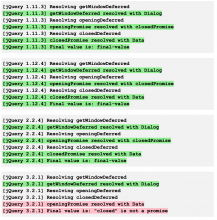Tested in Firefox 52.0.2 and Chromium 57.0.2987.98. The only difference in these tests is the version of jQuery; I get the same results with oojs-ui 0.21.1 and a3b3d21167.
Open the demo page, then open the browser's console and enter OO.ui.confirm("?").then( console.log ).
With jQuery 1.11.3, when you close the dialog it will log 'true' or 'false' depending on which button you clicked.
With jQuery 3.2.1, it will instead log an error, twice:
jQuery.Deferred exception: opened.then is not a function OO.ui.confirm/<@file:///usr/local/src/MediaWiki/oojs-ui/demos/dist/oojs-ui.js:23823:10 resolve/</mightThrow@file:///usr/local/src/MediaWiki/oojs-ui/demos/node_modules/jquery/dist/jquery.js:3583:21 resolve/</process<@file:///usr/local/src/MediaWiki/oojs-ui/demos/node_modules/jquery/dist/jquery.js:3651:12
The same sort of thing happens with OO.ui.alert() and OO.ui.prompt().
Testing some intermediate versions, jQuery up to 2.2.4 seems to work, while 3.0.0 doesn't (3.0.0 and 3.1.4 also have other issues).
